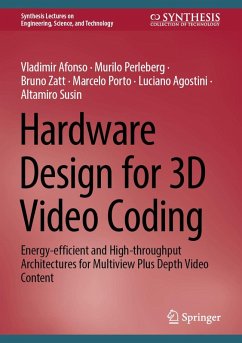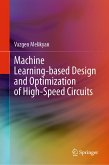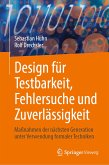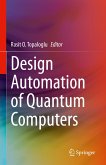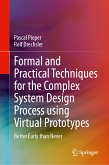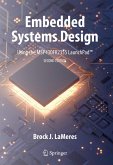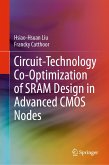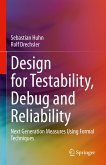Hardware Design for 3D Video Coding (eBook, PDF)
Energy-efficient and High-throughput Architectures for Multiview Plus Depth Video Content


Alle Infos zum eBook verschenken

Hardware Design for 3D Video Coding (eBook, PDF)
Energy-efficient and High-throughput Architectures for Multiview Plus Depth Video Content
- Format: PDF
- Merkliste
- Auf die Merkliste
- Bewerten Bewerten
- Teilen
- Produkt teilen
- Produkterinnerung
- Produkterinnerung

Hier können Sie sich einloggen

Bitte loggen Sie sich zunächst in Ihr Kundenkonto ein oder registrieren Sie sich bei bücher.de, um das eBook-Abo tolino select nutzen zu können.
This book focuses on the research and development challenges posed by 3D video systems based on multi-view plus depth (MVD) technology. This technology can produce a realistic immersive experience generating synthetic video views on the decoder side, reducing the amount of information on the encoder side. The discussion presented in this book explores the MVD characteristics to propose high-throughput and energy-efficient architectures/systems, focusing on 3D-HEVC, the state-of-the-art standard for exploiting the MVD concept. The book includes an extensive discussion of the 3D-HEVC video…mehr
- Geräte: PC
- ohne Kopierschutz
- eBook Hilfe
- Größe: 18.54MB
![Machine Learning-based Design and Optimization of High-Speed Circuits (eBook, PDF) Machine Learning-based Design and Optimization of High-Speed Circuits (eBook, PDF)]() Vazgen MelikyanMachine Learning-based Design and Optimization of High-Speed Circuits (eBook, PDF)81,95 €
Vazgen MelikyanMachine Learning-based Design and Optimization of High-Speed Circuits (eBook, PDF)81,95 €- -21%11
![Design für Testbarkeit, Fehlersuche und Zuverlässigkeit (eBook, PDF) Design für Testbarkeit, Fehlersuche und Zuverlässigkeit (eBook, PDF)]() Sebastian HuhnDesign für Testbarkeit, Fehlersuche und Zuverlässigkeit (eBook, PDF)86,99 €
Sebastian HuhnDesign für Testbarkeit, Fehlersuche und Zuverlässigkeit (eBook, PDF)86,99 € ![Design Automation of Quantum Computers (eBook, PDF) Design Automation of Quantum Computers (eBook, PDF)]() Design Automation of Quantum Computers (eBook, PDF)48,95 €
Design Automation of Quantum Computers (eBook, PDF)48,95 €![Formal and Practical Techniques for the Complex System Design Process using Virtual Prototypes (eBook, PDF) Formal and Practical Techniques for the Complex System Design Process using Virtual Prototypes (eBook, PDF)]() Pascal PieperFormal and Practical Techniques for the Complex System Design Process using Virtual Prototypes (eBook, PDF)97,95 €
Pascal PieperFormal and Practical Techniques for the Complex System Design Process using Virtual Prototypes (eBook, PDF)97,95 €![Embedded Systems Design using the MSP430FR2355 LaunchPad(TM) (eBook, PDF) Embedded Systems Design using the MSP430FR2355 LaunchPad(TM) (eBook, PDF)]() Brock J. LameresEmbedded Systems Design using the MSP430FR2355 LaunchPad(TM) (eBook, PDF)40,95 €
Brock J. LameresEmbedded Systems Design using the MSP430FR2355 LaunchPad(TM) (eBook, PDF)40,95 €![Circuit-Technology Co-Optimization of SRAM Design in Advanced CMOS Nodes (eBook, PDF) Circuit-Technology Co-Optimization of SRAM Design in Advanced CMOS Nodes (eBook, PDF)]() Hsiao-Hsuan LiuCircuit-Technology Co-Optimization of SRAM Design in Advanced CMOS Nodes (eBook, PDF)129,95 €
Hsiao-Hsuan LiuCircuit-Technology Co-Optimization of SRAM Design in Advanced CMOS Nodes (eBook, PDF)129,95 €![Design for Testability, Debug and Reliability (eBook, PDF) Design for Testability, Debug and Reliability (eBook, PDF)]() Sebastian HuhnDesign for Testability, Debug and Reliability (eBook, PDF)81,95 €
Sebastian HuhnDesign for Testability, Debug and Reliability (eBook, PDF)81,95 €-
- -19%11
-
In addition, this book includes:
- Provides a detailed description of the new MVD encoding tools used in 3D-HEVC.
- Offers an overview of state-of-the-art works on MVD hardware architectures.
- Includes high-throughput architectures for inter-prediction focused on Inter-frames and Inter-view predictions.
Dieser Download kann aus rechtlichen Gründen nur mit Rechnungsadresse in A, B, BG, CY, CZ, D, DK, EW, E, FIN, F, GR, HR, H, IRL, I, LT, L, LR, M, NL, PL, P, R, S, SLO, SK ausgeliefert werden.
- Produktdetails
- Verlag: Springer International Publishing
- Seitenzahl: 218
- Erscheinungstermin: 19. Februar 2025
- Englisch
- ISBN-13: 9783031802324
- Artikelnr.: 73420656
- Verlag: Springer International Publishing
- Seitenzahl: 218
- Erscheinungstermin: 19. Februar 2025
- Englisch
- ISBN-13: 9783031802324
- Artikelnr.: 73420656
- Herstellerkennzeichnung Die Herstellerinformationen sind derzeit nicht verfügbar.
Murilo Perleberg received the B.S. degree in computer engineering and the M.S. degree in computer science from the Federal University of Pelotas (UFPel), Brazil, in 2018 and 2020, respectively. He is currently pursuing the Ph.D. degree in computer science at UFPel. He is a member of the Video Technology Research Group, UFPel. His research interests include VLSI design for video coding.
Bruno Zatt received his B.E. and M.S. in Computer Engineering from the Federal University of Rio Grande do Sul (UFRGS), Porto Alegre, Brazil, in 2006 and 2008, respectively. He received his Ph.D. degree in Microelectronics from the PGMICRO (Graduate Program on Microelectronics) at the same university in 2012 with "summa cum laude" distinction. Currently, Bruno Zatt is a Professor at the Federal University of Pelotas (UFPel), Pelotas, Brazil, and a member of the Group of Architectures and Integrated Circuits (GACI) and the Video Technology Research Group (ViTech). He has 19+ years of research experience os digital signal processing including 3 years as an intern researcher at the Karlsruhe Institute of Technology (KIT), Karlsruhe, Germany, 1-year experience as a visiting professor at the University of California, Irvine, USA, and as visiting professor at the Università di Torino, Turin, Italy. He has published over 190+ papers in international journals/conferences and one book entitled "3D Video Coding for Embedded Devices". His expertise includes visual signal processing and coding standards such as 2D video coding (H.264, HEVC, AV1, VVC), multiview video coding (MVC), 3D video coding (3D-HEVC), and Light Fields coding (JPEG Pleno). He holds the status of IEEE Senior Member (since 2016) and CNPq (National Council for Scientific and Technological Development) productivity research fellow (since 2017). He has coordinated several research projects funded by public (FAPERGS, CNPq, CAPES) and private funding agencies (Instituto Serrapilheira). Prof. Zatt also contributes as a member of the Brazilian Committee on Audio, Image, Multimedia and Hypermedia Coding (under ABNT - Brazilian Association of Technical Standards), a member of the Brazilian Microelectronics Society (SBMICRO) council, and a member of IEEE CASS Visual Signal Processing and Communication Technical Committee (VSPC-TC). He served for four years as an adjunct coordinator and two years as coordinator of the Graduate Program in Computing at UFPel. Prof. Zatt also contributes as Coeditor of the Journal of Integrated Circuits and Systems (JICS), Associate Editor for the IEEE Open Journal of Signal Processing (OJ-SP), and Senior Associate Editor for the IEEE Transaction on Circuits and Systems for Video Technology (TCSVT).
Marcelo Schiavon Porto is a Brazilian Distinguished Researcher holding a CNPq PQ-1D grant. He received the M.S. and Ph.D. degrees in computer science from Federal University of Rio Grande do Sul (UFRGS), Brazil, in 2008 and 2012, respectively. He is currently a Professor with the Federal University of Pelotas (UFPel), Brazil, and a member of the Video Technology Research Group (ViTech) and the Group of Architectures and Integrated Circuits (GACI). He is currently a permanent member and advisor of doctor and master's students at the Graduate Program in Computing (PPGC) of UFPel. He also has been holding the status of CNPq (National Council for Scientific and Technological Development) Productivity Research Fellow, since 2016. His research interests include video coding, motion estimation algorithms, point cloud compression, coding complexity reduction, and energy-efficient VLSI design for video coding. Prof. Porto is a Senior Member of IEEE and member of SBC and SBMicro Brazilian societies.
Luciano Volcan Agostini is a Full Professor at the Federal University of Pelotas (UFPel), where he has been a faculty member since 2002. Currently, he is a CNPq Productivity Research Fellow (PQ) in category 1C and serves as Vice-President of the Brazilian Microelectronics Society (SBMicro). He founded and leads the Video Technology Research Group (ViTech) at UFPel. From 2017 to 2018, he conducted postdoctoral research at the University of Lisbon. He earned his Ph.D. (2007) and M.Sc. (2002) in Computer Science from the Federal University of Rio Grande do Sul (UFRGS). Agostini previously served as UFPel's Vice-President for Research and Graduate Studies (2013-2017) and as President of the Pelotas Municipal Council of Science and Technology (2013-2017). His work has earned him numerous best paper awards, and he has played an active role in organizing events internationally. He is an Associate Editor for IEEE Transactions on Circuits for Video Technology (TCSVT), IEEE Open Journal of Circuits and Systems (OJCAS), and Frontiers in Imaging. His research focuses on hardware design for image and video compression, machine learning-based video compression algorithms, and AV1, VVC, VP9, HEVC, and H.264/AVC encoders. He also investigates 3D, 360, light fields, and point clouds coding, as well as digital design with FPGAs, ASICs, and microelectronics. Agostini is a Senior Member of both the IEEE and ACM societies, and an active member of SBMicro and Brazilian Computer Society (SBC) societies.
Altamiro Amadeu Susin was born in Vacaria-RS (Brazil) in 1945. He holds a degree in Electrical Engineering and a master's degree from the Federal University of Rio Grande do Sul (UFRGS) in 1972 and 1977, respectively, and a PhD in Computer Engineering - Microelectronics from the Institut National Polytechnique de Grenoble-France in 1981. He spent one year at McGill University, Montreal-Canada (1997/8) as a researcher in the mixed-signal group. He is a professor, now retired, in the Department of Electrical Engineering at UFRGS, responsible for the disciplines of Analog and Digital Electronics in the graduate and undergraduate courses, where he worked for over 40 years. He is also or was a member of the Graduate Programs in Computer Science, Electrical Engineering and Microelectronics at UFRGS. His main research interests are Integrated Circuit Architecture, Systems on Chip and Networks on Chip for complex multi-core systems and Signal Processing with over 50 technical papers published in these areas. He is/was responsible for several publicly and/or industrially funded R&D projects covering electronic instrumentation, audio and image processing, digital TV and computer vision for medical instrumentation, robotics and driving assistance and has supervised over a hundred graduate and undergraduate students. He has also designed and organized conferences and workshops on the above mentioned topics. He was vice-president and president of the Brazilian Society of Microelectronics and has participated as a member of committees of several research funding entities.
